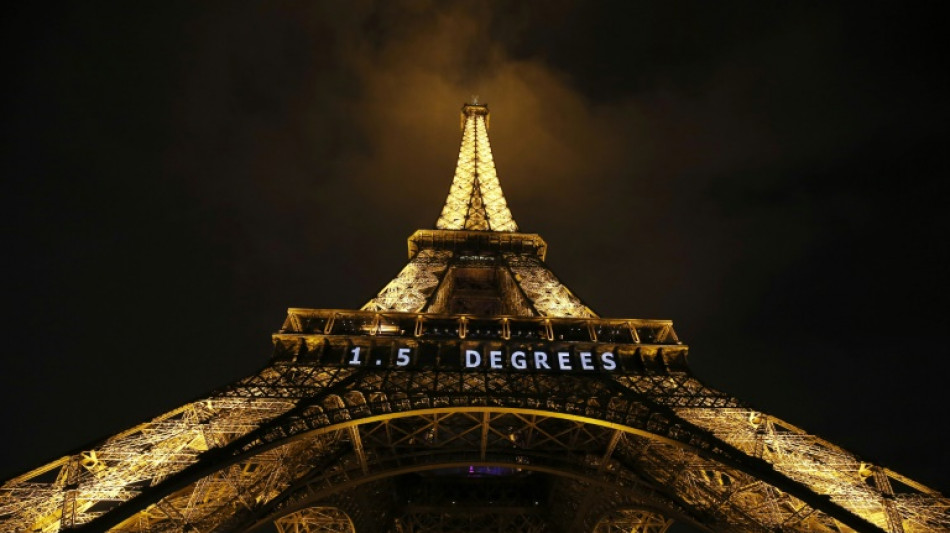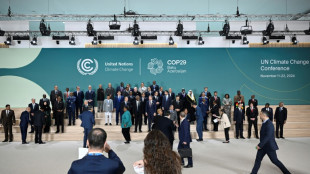
-
 Andy Murray to coach Novak Djokovic
Andy Murray to coach Novak Djokovic
-
Leipzig lose ground on Bayern, Dortmund and Leverkusen win

-
 Fear in central Beirut district hit by Israeli strikes
Fear in central Beirut district hit by Israeli strikes
-
Chinese film about Covid-19 wins Taiwan's top Golden Horse prizes

-
 Tuipulotu puts anger behind him as he captains Scotland against native Australia
Tuipulotu puts anger behind him as he captains Scotland against native Australia
-
Inter smash Verona to take Serie A lead

-
 Mass rape trial sparks demonstrations across France
Mass rape trial sparks demonstrations across France
-
Lebanon says 15 killed in Israeli strike on central Beirut

-
 Eddie Jones will revel in winding up England - Genge
Eddie Jones will revel in winding up England - Genge
-
Chelsea see off Leicester on Maresca's King Power return

-
 Storms bring chaos to Ireland, France, UK
Storms bring chaos to Ireland, France, UK
-
Berrettini gives Italy edge on Australia in Davis Cup semis

-
 Amber Glenn storms to gold in Cup of China
Amber Glenn storms to gold in Cup of China
-
High-flying Chelsea see off Leicester

-
 Climate-threatened nations stage protest at COP29 over contentious deal
Climate-threatened nations stage protest at COP29 over contentious deal
-
Families fleeing after 32 killed in new sectarian violence in Pakistan

-
 Ancelotti says 'ugly' to speculate about Mbappe mental health
Ancelotti says 'ugly' to speculate about Mbappe mental health
-
Failure haunts UN environment conferences

-
 Colapinto in doubt for Las Vegas GP after crashing
Colapinto in doubt for Las Vegas GP after crashing
-
Lebanon says 11 killed in Israeli strike on central Beirut

-
 Three arrested in Spain for racist abuse at Liga Clasico
Three arrested in Spain for racist abuse at Liga Clasico
-
Pope to skip Notre Dame opening for Corsica visit

-
 Tokyo police care for lost umbrellas, keys, flying squirrels
Tokyo police care for lost umbrellas, keys, flying squirrels
-
Neuville closes in on world title after Rally Japan recovery

-
 Jaiswal slams unbeaten 90 as India seize control against Australia
Jaiswal slams unbeaten 90 as India seize control against Australia
-
'Nice surprise' for Verstappen to edge Norris in Las Vegas GP qualifying

-
 Indian teen admits to 'some nerves' in bid for world chess crown
Indian teen admits to 'some nerves' in bid for world chess crown
-
Patrick Reed shoots rare 59 to make Hong Kong Open history

-
 Record-breaker Kane hits back after England criticism
Record-breaker Kane hits back after England criticism
-
Cameron Smith jumps into lead at Australian PGA Championship

-
 Russell on pole position at Las Vegas GP, Verstappen ahead of Norris
Russell on pole position at Las Vegas GP, Verstappen ahead of Norris
-
Philippine VP made 'active threat' on Marcos' life: palace

-
 Celtics labor to win over Wizards, Warriors into Cup quarters
Celtics labor to win over Wizards, Warriors into Cup quarters
-
Balkans women stage ancient Greek play to condemn women's suffering in war

-
 Nvidia CEO says will balance compliance and tech advances under Trump
Nvidia CEO says will balance compliance and tech advances under Trump
-
Grand Slam ambition dawning for Australia against Scotland

-
 Japan game set to leave England with more questions than answers
Japan game set to leave England with more questions than answers
-
Amorim's to-do list to make Man Utd great again

-
 What forcing Google to sell Chrome could mean
What forcing Google to sell Chrome could mean
-
Fears for Gaza hospitals as fuel and aid run low

-
 Anderson to Starc: Five up for grabs in IPL player auction
Anderson to Starc: Five up for grabs in IPL player auction
-
Big money as Saudi makes foray into cricket with IPL auction

-
 Budget, debt: Trump's Treasury chief faces urgent challenges
Budget, debt: Trump's Treasury chief faces urgent challenges
-
Trump names hedge fund manager Scott Bessent as Treasury chief

-
 Putin vows more tests of nuke-capable missile fired at Ukraine
Putin vows more tests of nuke-capable missile fired at Ukraine
-
Yin avoids penalty to keep lead as Korda charges at LPGA Tour Championship

-
 With favourites out MLS playoffs promise more upsets
With favourites out MLS playoffs promise more upsets
-
Trump to name hedge fund manager Scott Bessent as Treasury chief: US media

-
 Guardiola says 75 percent of Premier League clubs want Man City relegated
Guardiola says 75 percent of Premier League clubs want Man City relegated
-
'Unique' Netherlands beat Germany to reach first Davis Cup final


Dreaming the impossible dream: the 1.5C climate target
In the realm of climate diplomacy, it's the little engine that could, the 80-to-1-odds Kentucky Derby winner, the low-budget multiverse fantasy that came out of nowhere to sweep the Oscars.
We are talking, of course, about the Paris Agreement goal of capping Earth's average surface temperature at 1.5 degrees Celsius above levels in the late 19th century, when burning fossil fuels began to seriously heat up the planet.
At barely 1.2C above that threshold, the world today has already seen a crescendo of deadly and destructive extreme weather.
Fifteen years ago, a 1.5C limit on global warming -- championed by small island nations worried about sea level rise -- was rejected by most scientists as unrealistic and by most countries as unnecessary.
A 2C "guardrail" was assumed to be safe enough.
Today, the 1.5C target is enshrined in everything, everywhere, all at once. While technically no more than an "aspirational" goal, it has become the de facto North Star for UN climate talks, national climate plans and the business world.
From Apple and Facebook to Big Pharma and even Big Oil, multinationals have unveiled promises and plans to be "1.5C-aligned", even if most of those plans don't hold up very well under scrutiny.
You can draw a straight line from 1.5C to the science-base imperative to nearly halve global emissions by 2030 and achieve net zero around mid-century, meaning any residual carbon pollution must be offset by removals.
Both of these targets are set to be affirmed in a report summarising six years of climate science, released Monday by the UN's Intergovernmental Panel on Climate Change (IPCC).
- 2C not good enough -
This raises a perplexing question, according to Beatrice Cointe, a sociologist at France's National Centre for Scientific Research and co-author of a recent study on the history of the 1.5C target.
"How did an almost impossible target become the point of reference for climate action?" she asked.
And what will happen when the world experiences its first full year at or above 1.5C, which the IPCC says could easily happen within a decade, even under aggressive emissions reduction scenarios?
"The target appears increasingly unattainable," Cointe and co-author Helene Guillemot, a historian of science at the Centre Alexandre-Koyre, wrote in the journal WIREs Climate Change.
"And yet calls to 'Keep 1.5C Alive' have been growing louder."
The backstory of the 1.5C goal reveals an interplay of science and politics, with one driving and shaping the other.
Going into the 2015 climate negotiations that yielded the breakthrough Paris treaty, it seemed unlikely that 195 nations would significantly improve on the 2C target already set in stone.
But a scientific evaluation by a UN technical body delivered ahead of the December summit sounded an alarm about the dangers of a +2C world and suggested greater ambition might be wise.
"While science on the 1.5C limit is less robust, efforts should be made to push the defence line as low as possible," it concluded.
A growing coalition of developing nations, meanwhile, had gathered behind the 1.5C goal, eventually joined by the European Union and the United States.
Emerging giants and oil exporters baulked, fearful of the constraints on their fossil-fuel dependent economies.
"China was against it, India was against it, Saudi Arabia fought us tooth-and-nail to the very end," recalled Saleemul Huq, director of the International Centre for Climate Change and Development in Dhaka.
Even today, these nations remain lukewarm on the idea.
But in the end, nearly 200 nations committed to cap warming at "well below 2C", while "pursuing effort to limit the temperature increase to 1.5C."
- 'A moral target' -
It was a stunning diplomatic coup. Many scientists, however, were less than thrilled.
"It will be very hard -- if not impossible -- to keep warming below 1.5 C during the entire 21st century," Joeri Rogelj, a climate modeller currently at Imperial College London who played a key role in the technical report, told AFP at the time.
But because the target was part of the Paris Agreement, nations called on the IPCC -- which exists to brief policymakers on climate science -- for a "special report".
The resulting bombshell, delivered in October 2018, left no doubt as to the difference a half-a-degree makes: a 1.5C world will see deep change but remain liveable; a 2C world could tip the climate system into overdrive, outstripping our capacity to adapt, it warned.
Today, the IPCC -- including Rogelj, a lead author of the 2018 report -- insists that the 1.5C goal is technically feasible.
But that conclusion hangs by the thinnest of threads.
There is no scenario that avoids "overshooting" the target, and bringing temperatures back under the wire will require extracting billions of tonnes of CO2 from thin air, something we can't do yet at scale.
But whether the 1.5C target is feasible may be missing the point, say others.
"Getting 1.5 C into the agreement was a moral target," Huq told AFP not long after the Paris pact was inked.
"It's our leverage, the whip we will use to hit everybody on the back so they can go faster," he added.
"Whether we achieve it or not is going down a dark track. From now on, it's about raising ambition."
Piers Forster, director of the University of Leeds Priestley International Centre for Climate and a coordinating lead author for the IPCC, describes the 1.5C objective as a "huge, but not impossible, task".
"Hopefully the IPCC report can push the urgency," he told AFP. "If it's ignored, we would have to give up on 1.5C."
F.Müller--BTB


